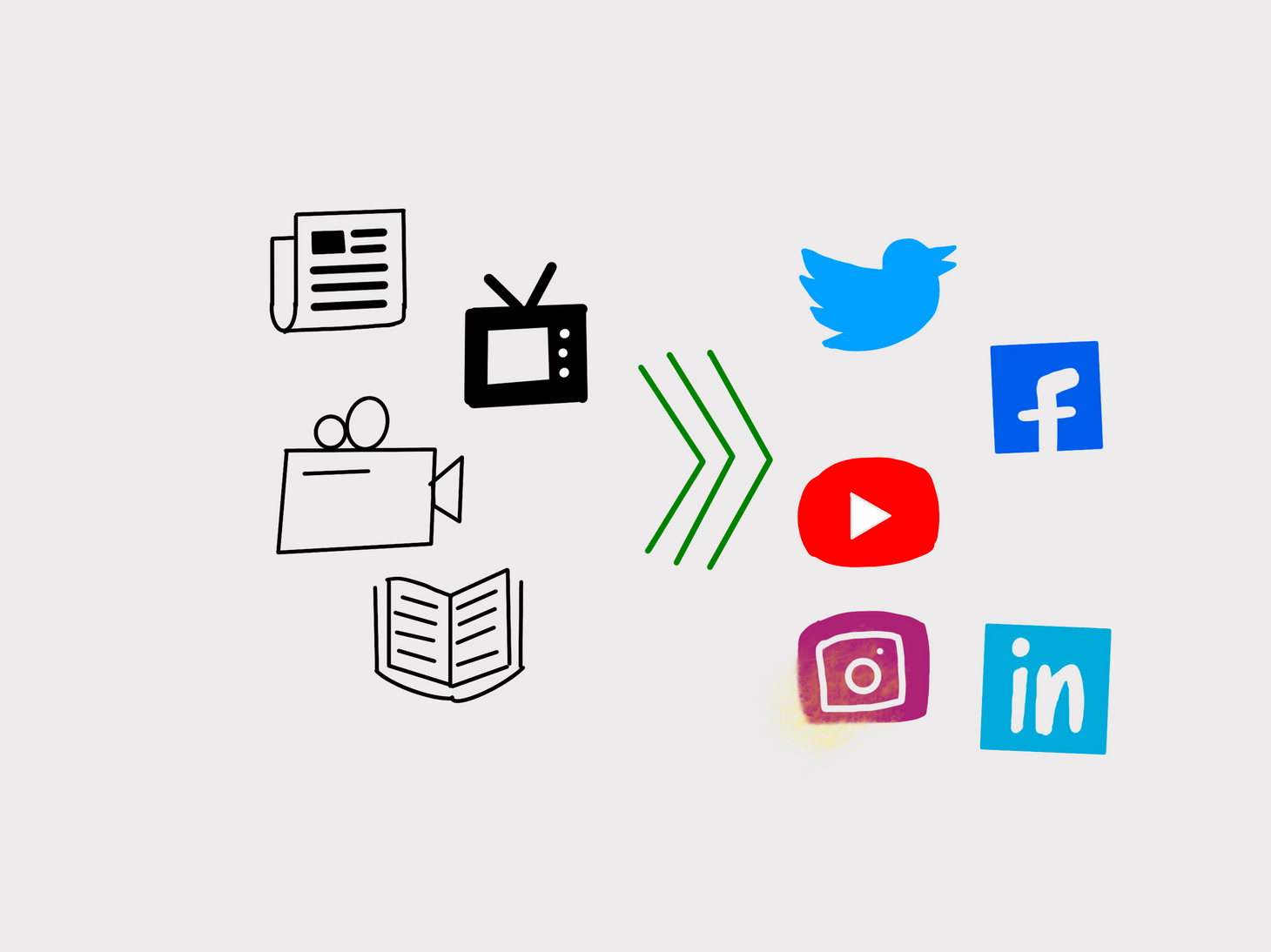The Evolution Of Media
From a local tight knit fraternity to a Silicon Valley controlled platform play.

Table of Contents
Hey there!
I hope you had a happy and safe entry into 2021.
The last article I published was probably the most personal one I’ve written till date. If you haven’t seen it already, and are looking for some inspiration, here’s a link to it. :)
Here’s the soundtrack I was listening to while writing this article. Go ahead, play it in the back. :)
Over the last week, I’ve made some changes to Stebi and have included three new sections. Book Notes will cover my learnings from books I’ve read and enjoyed. Under Company Analysis (coming soon), I’ll research a company listed on the stock exchange in India, unpack its strategy, and comment on its investment worthiness. And Summaries is an index of bite-sized, Twitter thread versions of weekly articles, for our friends who don’t like reading long-form content. This iteration of Stebi solves three purposes — one, I get to document my work and swing back to it whenever I need to; two, it forces me to read a book and analyse a company, every month (wish me luck!); and most importantly, three, I share more of my journey with other investing enthusiasts with the hope that it serves them well in their own pursuit.
Onto today’s article. Businesses are built in places where people spend a lot of time. Earlier it was in cities, now it’s on online platforms. Think of all the new Instagram pages you’re noticing. A baking page, a boutique jewellery brand, a child model page, and so on. This article articulates the transition of the media business.
When someone puts their work — text, image, audio, video, sculpture, building, and the like — in the public eye, knowingly or unknowingly, they’re seeking recognition. It was the same when someone submitted an article or a cartoon to a newspaper, as it is now, when one posts their content digitally on various internet platforms. Reads, views, likes, comments, shares and subscribes are actual humans who saw beauty or value in that piece of content. Wonderful feedback loops created in today’s times. Receiving adulation means a lot to any creator, and the lack of it hurts just as bad. But, having the opportunity to put one's work out there is a tremendous privilege. It wasn’t always this easy.
In pre-internet times — mass media (newspapers and radio), publishing (books), and the video industry (TV and film), let’s call them gatekeepers — controlled the supply of content. They supplied their product to — cinema houses, book stores, and other retail outlets, let’s call them downstream infrastructure players; the only source of information and entertainment for the masses. This tight-knit fraternity basically had creators at their mercy. Creators wanted to show their work to the masses, and the masses were behind a door, to which gatekeepers (through their downstream infrastructure players) held the keys.
Becoming a gatekeeper wasn't easy either. One needed deep pockets to build out the entire distribution funnel, since the incumbents were all too happy to keep outsiders out.
Then came the internet, and this model changed completely. Debilitating traditional gatekeepers in the process. From being the hardest problem in the past, distribution became the easiest part. As the internet went from strength to strength, users could now stream even 4K video; text, image and audio became as they’d say, a piece of cake. Content could now easily live online, without a need for book stores and cinema houses. This was strike one. Then, with behavioural psychology embedded right into their business models, social media platforms hooked users into happily giving up large chunks of their attention. So now, audiences had another source of information and entertainment, ie social media. This was strike two. And finally, strike three was the proliferation of internet-connected devices like mobiles, tablets, and computers. Creators, empowered with affordable internet-connected devices, social media, and the power of the internet, didn’t need to go to gatekeepers anymore. The traditional gatekeeper business model was crushed.
Internet creators and influencers went on an amazing run. With worries around distribution out of the way, they could just focus on producing their content and putting it out there. Those who achieved success lived some version of the following story:
- Start publishing free content on your favourite platform. The only investment was time. They were already paying for their internet connection, and their devices.
- Do it regularly. This was the hard part.
- With time, one’s content improves and a loyal following starts getting built. Obviously, this requires luck.
- This audience attention earned is an asset, use it to build revenue streams from — showing ads, selling products or services, getting consulting assignments. And scale!
We’re living in the heyday of internet creators. What the internet has done for them in terms of recognition, wealth and influence cannot be understated. A simple Google search of their earnings says it all.
What I think about though is, is this here to stay? I find it doubtful. All the marketing around — “for creators only”, and “everybody should create” — seems a bit pretentious.
It’s a basic law of nature that everything with a beginning has to have an end. That clubbed with, society is all about division of labour implies that this is just a trend, like many others before it. The obsession with creation will fade, and the need for maintainers, sustainers, even demolition jobs will arise.
On really zooming out we notice that, the media industry has seen a local tight-knit fraternity replaced by a global fraternity of (mostly) Silicon Valley platforms. The lobby that exerted control gave way to platform algorithms (the computer code that decides what content users see, and what they don’t see). These internet platforms are far more powerful than the lobbies they’ve replaced. And if not kept in check, can do more damage that just denying creators their deserved chances. Realisation of this fact propels those who run internet businesses to build websites and email subscriptions. They don’t like being fully dependent on a social media platform.
The landscape of the game has changed, but human nature is still at play. Too much power, and too much wealth has a tendency of bringing out the worst human qualities like greed and pride. And just like traditional gatekeepers might have fallen into that trap, history suggests that these internet platforms are susceptible as well.
I hope you enjoyed this article as much as I enjoyed writing it. :)
If you have a creative itch, by all means start publishing your work online. Only two suggestions: one, accept that your initial work won’t be very good. It’ll save you from a lot of heartache. And two, even if you’re heavily dependent on a social media platform to beget traffic, be sure to build a website to own that small corner of the internet.
Until next week! ✌🏼
Stebi Newsletter
Join the newsletter to receive the latest updates in your inbox.

